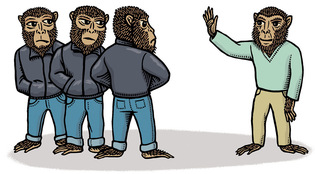 loading
loading
FindingsThe in crowd Gregory NemecView full image
For those who struggled to join a junior high clique as a teen, or even tried to become one of the gang at a new workplace, it’s clear how the “us versus them” mindset affects human relationships. A new study suggests that that in-group exclusivity may predate our culture by millions of years. Laurie Santos, an associate professor of psychology, says she and her team set out to find out the origins of our preference for our own groups. One long-standing hypothesis, explains Santos, who leads the Comparative Cognition Laboratory at Yale, “is that we grow up in a world that teaches these distinctions and in cultures that promote distinctions. The other is that these things are more built-in.” Their study, in theJournal of Personality and Social Psychology, finds that humans and primates share similar biases against members of other groups—biases that may have been passed down from a common ancestor. The psychologists selected a group of rhesus macaque monkeys living in a free-ranging colony, established by scientists years ago, on an island off the coast of Puerto Rico. The team showed individual macaques photographs of other island monkeys, using an adapted version of a human test of bias. The test, which measures how long each monkey looks at a pair of images, is based on the tendency of both humans and primates to process similarly valued images faster, and to look longer at more startling or new combinations. All the tests took place in the monkeys’ habitat. Researchers compared how long subjects looked at pictures of monkeys from inside and outside their group. Images of each type were shown in a sequence with images of “positive” or “negative” items, such as bananas or spiders (anathema to rhesus macaques). Male monkeys looked longer at combinations that paired group members with dangerous images or outsiders with happier ones—demonstrating, that, like humans, they have a tendency to associate group members with positive notions. “The fact that we found similar biases in a species without our language, nature, or culture suggests that these things are not necessary for our biases to exist,” says lead author Neha Mahajan ’11PhD. Because we share ancestors with the macaques, she explains, “it’s also potentially adapted in our history.” Still, there is hope for the monkeys—and for us—to change our preferences. A rhesus macaque male periodically leaves his group and joins another. The monkeys showed bias against an outsider who had belonged to their own group until just weeks before, Mahajan says, suggesting that they update their preferences in real time. Humans may be capable of the same thing. “We can harness that flexibility to fight the negative effects of bias,” she says.
The comment period has expired.
|
|